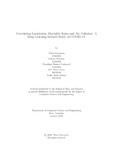Correlating lockdowns, mortality rates and air pollution: a deep learning imbued study of COVID-19
Abstract
Nationwide lockdowns implemented in consequence of the devastating COVID-19
pandemic, caused noticeable improvements in air quality throughout the world.
This paper implements a multivariate long-short term memory network to forecast
changes in the Air Quality Index and Particulate Matter 2.5 (PM2.5) concentration
for 26 cities in India, and 50 cities in Europe, had their lockdown not occurred
or been extended. A linear regression model was used to correlate confounderadjusted PM2.5 values with COVID-19 mortality rate in the U.S.A. Heat maps were
visualized with K-Means Clustering that signified the correlation between increased
air pollution with higher COVID-19 cases and mortality rates. Our results indicate
that 76% of the European cities in our dataset underwent at least a 40% improvement
in air quality as a result of their lockdowns, whereas 17 out of the 26 Indian cities
observed 20%. Adjusted PM2.5 was seen to be a statistically significant contributor
to increasing mortality rate, with a single unit increase contributing to 3% more
deaths due to COVID-19, at a 95% confidence level.

